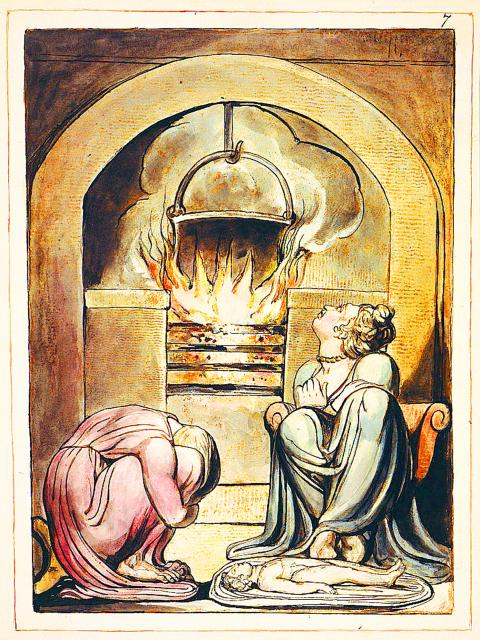Chinese practice
釜底抽薪
(fu2 di3 chou1 xin1)

Photo: Wikimedia Commons
照片:維基共享資源
remove firewood from under the cauldron
成語「釜底抽薪」中的「釜」,是古代的一種烹飪器具,也就是現在所說的鍋子;而「薪」則是柴火。「釜底抽薪」的字面意義為,從鍋底抽掉柴火,用來比喻從根本上解決問題。其意旨或許要跟與它相對的另一個成語「揚湯止沸」相比較,才能更加凸顯。「揚湯止沸」意為將鍋中的沸水舀起,再倒回去,以止住沸騰,比喻只是暫時紓解困境,但無法根本解決問題。
這兩個成語一般認為皆出自《呂氏春秋》的〈季春紀.盡數〉。該篇談到養生之道,批評當時的社會崇尚占卜祈禱,反而造成愈來愈多的疾病。這就像是射箭的人沒射中箭靶,卻不思糾正自己的毛病,反而去修正箭靶的位置──這對要射中目標能有什麼幫助?文章接著以比喻說道:「夫以湯止沸,沸愈不止,去其火則止矣。故巫醫毒藥,逐除治之.故古之人賤之也,為其末也。」(用燒滾的水阻止水的沸騰,沸騰越發不能阻止,撤去其下的火,沸騰自然就止住了。巫醫、藥物的作用只是驅鬼治病,所以古人輕視這些東西。因為這些東西對於養生來說只是枝微末節啊!)
用英語來說,我們可以說這是解決問題的根源(getting to the root of a problem),或從源頭上解決問題(approaching the problem from its source)。「釜底抽薪」有時可英譯為「pulling the rug from under one’s feet」(從某人腳下扯地毯)。「釜底抽薪」和「pulling the rug from under one’s feet」這兩種習語的確都產生了強烈且可立即理解的意象,但須注意的是,這兩者的用法並不完全相同:pull the rug [out] from under one’s feet(將地毯從人的腳下拉出來)比較是指突然撤回對某人的支持,或是扣留、拒絕給予對方所依賴的或一心以為可以仰賴的事物。
(台北時報林俐凱譯)
面對全球塑膠廢棄物氾濫的問題,釜底抽薪之計便是從源頭上控管,禁止商家提供塑膠袋。
(The most direct way to address the global plastic waste crisis is to go to the source of the problem and ban businesses from providing plastic bags.)
若要落實保育,禁止獵捕鯊魚只是揚湯止沸,禁止食用魚翅才是釜底抽薪。
(If we are going to protect sharks, a simple ban on catching them isn’t going to cut it; we need to ban the consumption of shark’s fin.)
英文練習
pull the rug from under somebody’s feet
The character 釜 in the idiom 釜底抽薪 refers to a vessel used to cook food in ancient times, and still refers to a cooking pot or cauldron today. The character 薪 means firewood. The literal meaning of the idiom is to pull the firewood from under the cauldron and, by extension, is a metaphor for solving a problem by removing the thing causing it to persist. For its usage we can perhaps compare it to another idiom, 揚湯止沸, which implies quite the opposite. The literal meaning of 揚湯止沸 is to spoon boiling liquid from a cauldron, and then to pour it back in, to keep the ferocity of the boil under control. Unlike 釜底抽薪, this idiom means deciding upon a temporary solution that mitigates a problem without being able to resolve it.
These two idioms are generally thought to derive from the jinshu section of the jichun ji chapter of the Warring States period encyclopedic text lushi chunqiu (Annals of Master Lu). This section discusses the way to cultivate a healthy life, and is critical of how, at the time, people believed in divination and praying to the ancestors to solve problems, but how this reliance only exacerbated the incidence of disease. The text likens this to an archer who cannot hit a target but, rather than look to improving his own shortcomings, decides instead to move the position of the target. It asks whether this is really of any help to the archer’s ability to hit the target? It goes on to use a metaphor, saying 夫以湯止沸,沸愈不止,去其火則止矣 (It’s like using boiling water to control boiling: the more one tries, the more impossible it becomes. If, however, one removes the fire from under the water, then the boiling will naturally abate), and continues “Shamen and their medicine could only seek to cure illness by driving out evil spirits, so the ancients did not put much faith in them. Such approaches were good for little more than helping the superficial symptoms.”
In English, we can talk of getting to the root of a problem, or approaching the problem from its source. The idiom 釜底抽薪 is sometimes translated as “pulling the rug from under one’s feet.” The two idioms do, indeed, elicit a strong and an immediately understandable image, but the usage differs: To pull the rug [out] from under somebody’s feet is to suddenly withdraw support for somebody, or to withhold or deny something that they had relied upon, or fully expected to be able to count on.
(Paul Cooper, Taipei Times)
The decision to cut health benefits for immigrants has really pulled the rug out from under the feet of many who are already struggling.
(政府決定削減移民的健保福利,這讓很多已陷入困境的移民頓失所依。)
If he doesn’t start working faster we’ll have to cut his bonus. That will pull the rug from under his feet.
(如果他不開始加緊腳步工作,我們會扣他的獎金,這對他會是當頭棒喝。)

In an effort to fight phone scams, British mobile phone company O2 has introduced Daisy, an AI designed to engage phone con artists in time-wasting conversations. Daisy is portrayed as a kindly British granny, exploiting scammers’ tendency to target the elderly. Her voice, based on a real grandmother’s for authenticity, adds to her credibility in the role. “O2” has distributed several dedicated phone numbers online to direct scammers to Daisy instead of actual customers. When Daisy receives a call, she translates the scammers’ spoken words into text and then responds to them accordingly through a text-to-speech system. Remarkably, Daisy

Bilingual Story is a fictionalized account. 雙語故事部分內容純屬虛構。 Emma had reviewed 41 resumes that morning. While the ATS screened out 288 unqualified, she screened for AI slop. She could spot it a mile away. She muttered AI buzzwords like curses under her breath. “Team player.” “Results-driven.” “Stakeholder alignment.” “Leveraging core competencies.” Each resume reeked of AI modeling: a cemetery of cliches, tombstones of personality. AI wasn’t just changing hiring. It was draining the humanity from it. Then she found it: a plain PDF cover letter. No template. No design flourishes. The first line read: “I once tried to automate my

Every May 1, Hawaii comes alive with Lei Day, a festival celebrating the rich culture and spirit of the islands. Initiated in 1927 by the poet Don Blanding, Lei Day began as a tribute to the Hawaiian custom of making and wearing leis. The idea was quickly adopted and officially recognized as a holiday in 1929, and leis have since become a symbol of local pride and cultural preservation. In Hawaiian culture, leis are more than decorative garlands made from flowers, shells or feathers. For Hawaiians, giving a lei is as natural as saying “aloha.” It shows love and

1. 他走出門,左右看一下,就過了馬路。 ˇ He walked outside, looked left and right, and crossed the road. χ He walked outside and looked left and right, crossed the road. 註︰並列連接詞 and 在這句中連接三個述語。一般的結構是 x, y, and z。x and y and z 是加強語氣的結構,x and y, z 則不可以。 2. 他們知道自己的弱點以及如何趕上其他競爭者。 ˇ They saw where their weak points lay and how they could catch up with the other competitors. χ They saw where their weak points lay and how to catch up with the other competitors. 註:and 一般連接同等成分,結構相等的單詞、片語或子句。誤句中 and 的前面是子句,後面是不定詞片語,不能用 and 連接,必須把不定詞片語改為子句,and 前後的結構才相等。 3. 她坐上計程車,直接到機場。 ˇ She took a cab, which took her straight to the airport. ˇ She took a cab and it took her straight